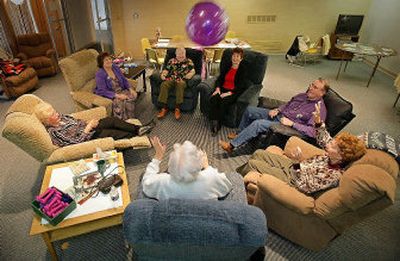Rest stop

BOISE – At 73, Madonna Burchfield knows that time is precious.
There’s the time she has left with her husband, 78-year-old Darrell Burchfield, who is suffering from dementia. And the moments she can steal away from him, giving her psyche time to recuperate from the constant requirements of care-taking.
He was diagnosed two years ago and since last September has needed 24-hour care. But Madonna Burchfield doesn’t want to put her husband in a nursing home, so she’s turned to one of Idaho’s few elder day care centers.
“I’m lucky because I have all my family here, and they take him one day a week,” she said. “And one day a week, he likes to go to the CARE Club.”
The Community Alzheimer’s Respite and Environment Club, that is. The nonprofit, non-denominational elder day care facility is run by a consortium of local churches and held in a space donated by the Cathedral of the Rockies in Boise.
Similar elder day care facilities are more common in heavily populated cities on the East Coast, said Judy Matulonius, the club’s director. But in the West – where the elderly population is rapidly growing and more people live in rural areas – the centers are rare.
Matulonius hopes that the CARE Club will serve as a template for other churches and organizations that want to offer similar services. “It’s unbelievable, but there’s really nothing like this in Idaho. We’ve got two other churches in Boise interested already, and churches in Twin Falls, Caldwell. Hopefully down the road we’ll have more and more popping up,” she said.
There’s a national need, according to the U.S. Department of Health and Human Services’ Administration on Aging. According to 2004 statistics, 11 percent of older Medicare enrollees received personal care in 1999. More than 90 percent of older people with chronic disabilities received care, most from children or spouses.
“Baby boomers are making up a lot of the caregiving population,” said Lois Bauer, administrator of the Idaho Commission on Aging. “Our population of elderly folks is growing dramatically, very much like many of the other Western states.”
Some nursing homes are opening their doors to day care clients, but not many, Bauer said. “It’s a very costly project. There’s no funding for it – period. We’ve had no increases in the past three years in federal dollars, and no increase in state dollars,” she said.
Bauer hopes the church-run day cares will spread, picking up the slack.
For Madonna Burchfield, the club is a sanity-saver. For the first 52 years of marriage, both Madonna and Darrell valued time spent apart. He often met with friends for lunch, and Madonna – an artist – treasured the solitary hours she spent working with her clay.
Now, she said, Darrell Burchfield panics when left with people he doesn’t know, a common symptom of dementia.
“When we go to a grocery store, I don’t go down an aisle where he can’t see me because he panics,” she said. “But he’s happy to go to the CARE Club, because he knows and enjoys the people there. I think if I didn’t have some respite, I would get depressed.”
The club is only open three days a week and can handle 10 people at a time, but someday Matulonius hopes to offer longer hours.
“The best-case scenario is that we expand and we have a waiting list, because that will prompt other churches to step in,” she said.
In the meantime, Burchfield said, she’s one of the lucky ones.
“My younger son says, ‘Do you get depressed?’ ” Burchfield said. “Well, yes, for about five minutes, and then I say to myself, ‘Madonna, you have so much to be thankful for, so get busy.’ “
And when it gets the toughest, she said, she reminds herself that the next CARE Club is just a few days away.